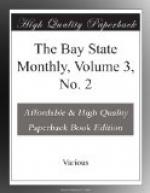Glorious, grand, old mountain, lifting thy brow among the eternal snows; thou needst not the presence of Jove, nor the voice of a Homer to consecrate thee; and although Greeks and Trojans have never battled at thy base, still to us art thou dearer than Ida’s wooded height where the gods sat enthroned to witness that divinely-recorded combat. Thy hoary peaks bear the names of chiefs and heroes who are not myths, and in the hearts of the people they are an everlasting memory.
[Illustration: White mountain Notch.]
* * * * *
THE PAST AND FUTURE OF SILVER.
By David M. Balfour.
Silver, next to iron and gold, is the most extensively diffused metal upon our planet. It is found frequently in a natural state, though never chemically pure, being invariably mixed with gold or copper, or sometimes antimony, arsenic, bismuth, quick-silver, or iron. It is distinguished by its whiteness, its brilliant lustre when polished, its malleability, and its indifference to atmospheric oxygen. It is remarkable for its beauty, and is ten times heavier than water. It does not appear to have been in use before the deluge. Moses does not allude to it before that event, but mentions only brass and iron; but in Abraham’s time it had become common, and traffic was carried on with it, and its value was eight to one of gold. “He was rich in silver and gold, and bought a sepulchre for his wife Sarah for four hundred shekels of silver” ($250.) It was not coined, but circulated only in bars or ingots, and was always weighed. Silver usually takes precedence in the Scriptures, whenever the two metals are mentioned conjunctively. “Silver and gold have I none,” said Peter to the importunate beggar, “but such as I have, I give unto thee.” Silver is first mentioned in Genesis xxiii: 15; but where it was first found is unknown to us.
Silver was extremely abundant in ancient times. “And Solomon made silver to be in Jerusalem as stones.” (I Kings x: 27.) “Cyrus heaped up silver as the dust.” (Zacariah ix: 3.) In the earliest times the Greeks obtained silver from the Phoceans and Laurians. The chief mines were in Siphnos, Thessaly, and Attica. In the latter country the silver mines of Laurion furnished an abundant supply, and were generally regarded as




